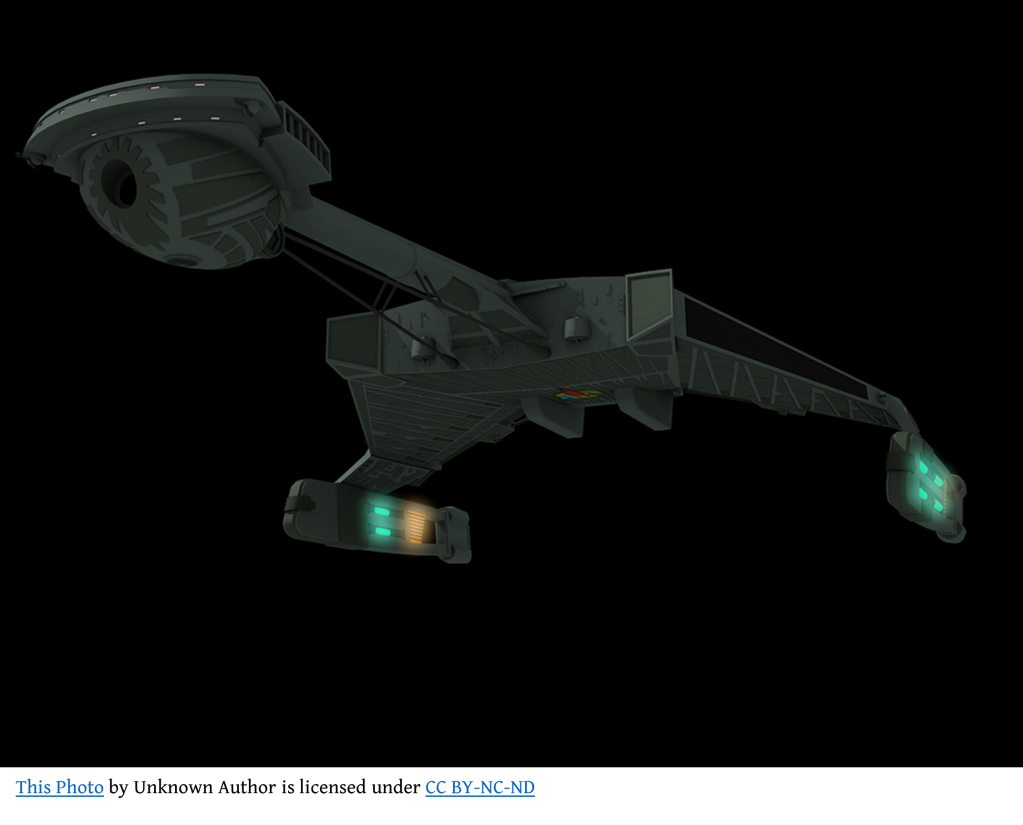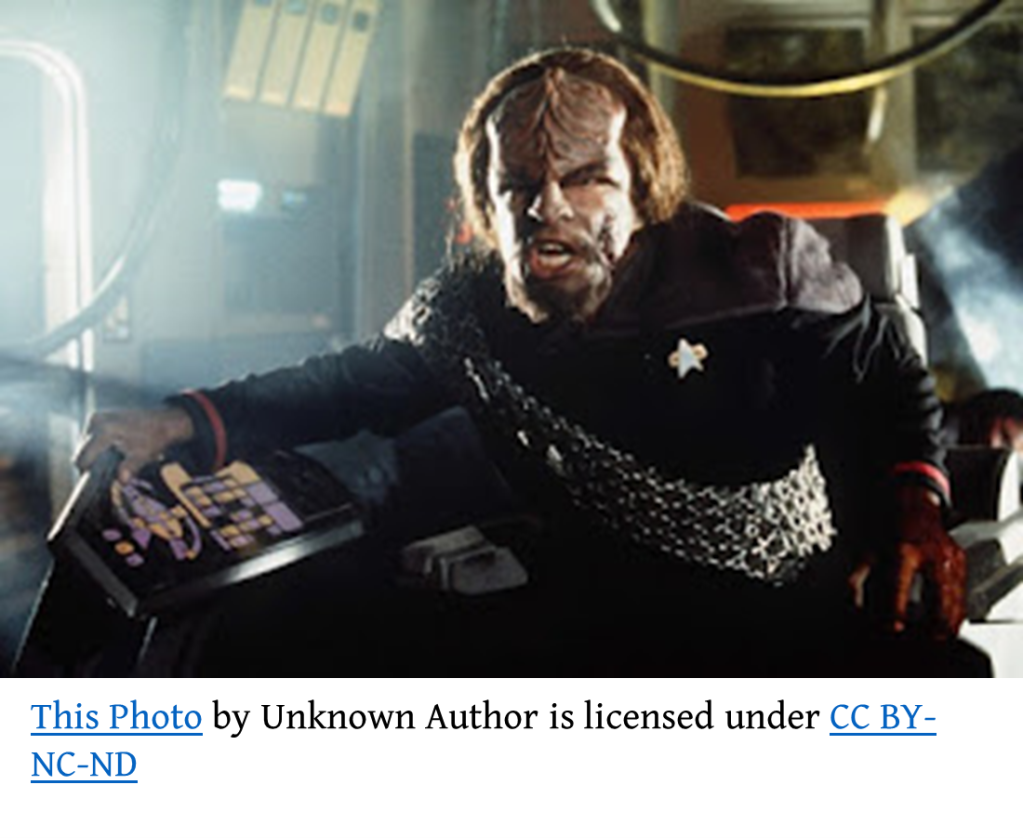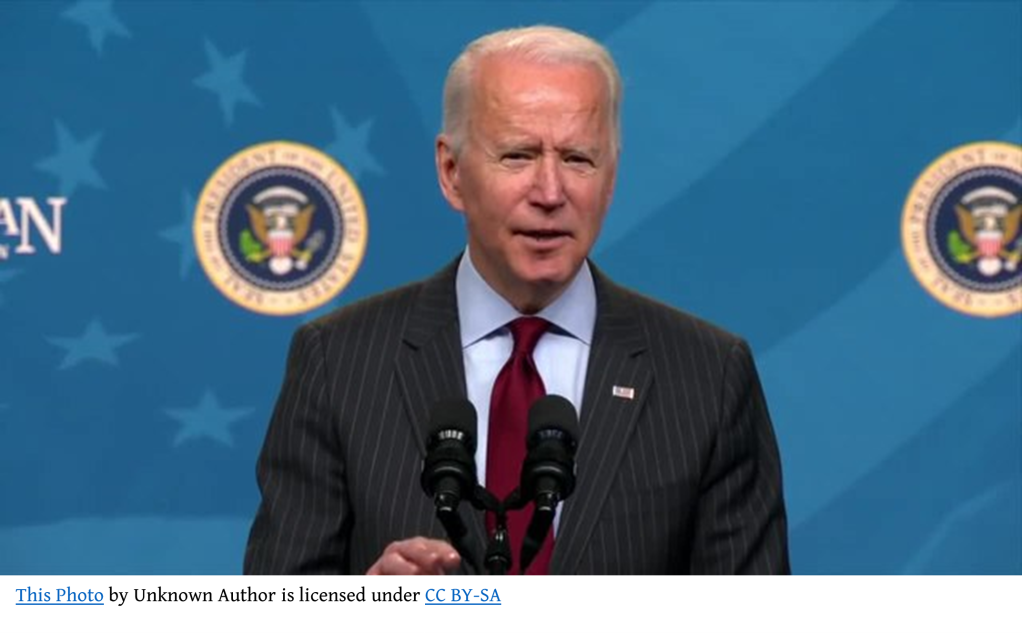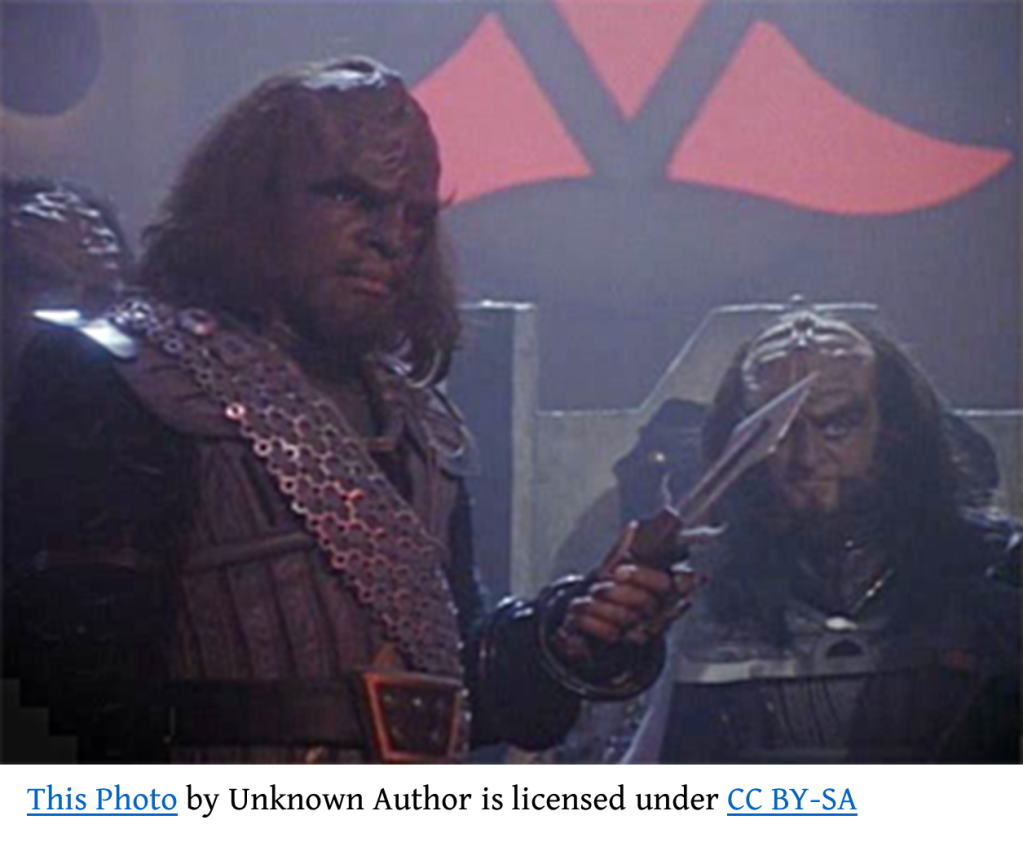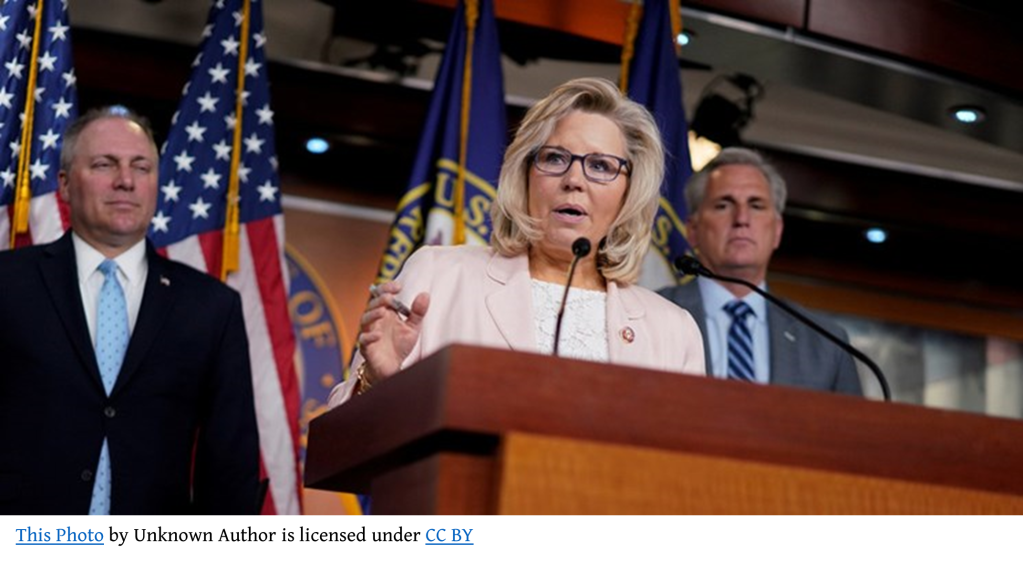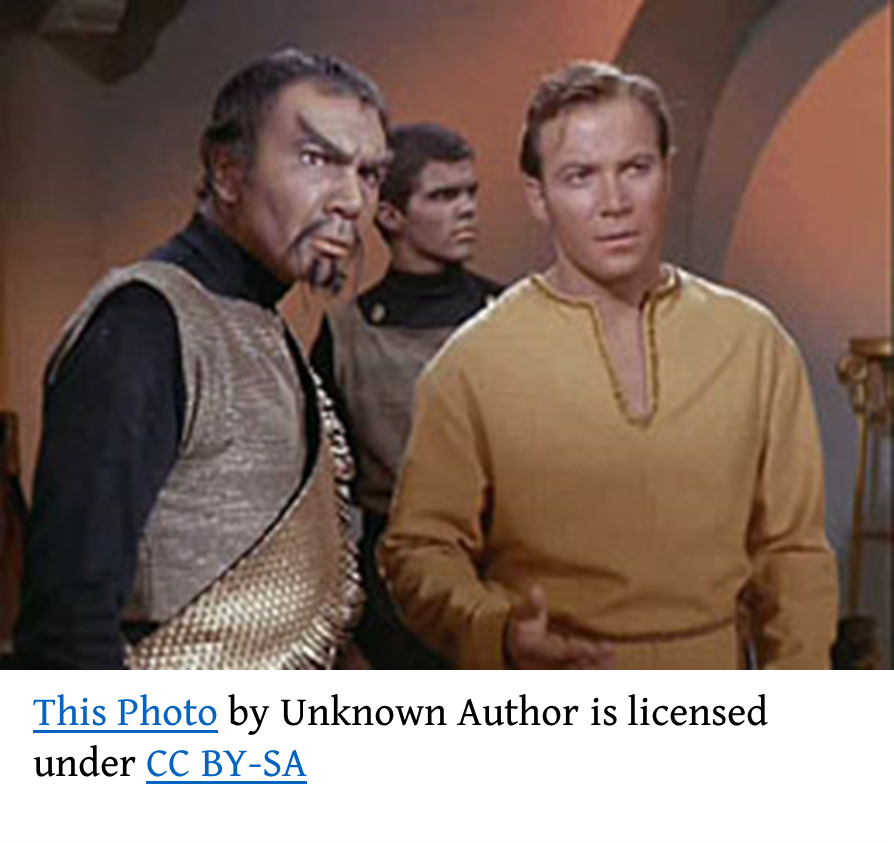In Star Trek II, Khan tells us that “Revenge is a dish best served cold.” The line is certainly not original to him. A Google search and Wikipedia suggest it goes back at least as far as a French diplomat named Charles Maurice de Talleyrand-Périgord (1754–1838) . It’s hardly surprising to learn that the desire for revenge is deeply embedded in human beings. If someone hurts us, we want to hurt them back. Every civilization of which I’m aware has some form of punitive laws that decide what pain we will cause someone else who has inflicted pain on us. When you feel the desire to exact vengeance, you’re hardly unique. It makes you believe you feel better. Perhaps it even really does. I question the value of that feeling. I would prefer you feel better showing love than hurting someone you believe deserves it.

There are two examples of the need for revenge with which most of the world is at least somewhat familiar. The first is Hamlet, one of the most famous fictional characters in all of literature. The second is Indigo Montoya, who is beloved by the millions who are passionate about “The Princess Bride.” Both are excellent examples of the fact that revenge doesn’t work out well.
Khan tells us it’s a dish best served cold. What does he mean by that? Since it’s a part of a piece of Art, your opinion is certainly as valid as mine. To me, it means that it’s been sitting around a while. The heat has dissipated. With the exception of sushi (which, for me, is a punishment all its own anyway) and ice cream (which is a sweet treat that seems hardly appropriate), nearly everything humans eat is preferable when it’s fresh out of the oven or off of the stove… or, if you’re me, from the microwave. Waiting for it to get cold is to spoil it. It has lost most of its flavor. This is, according to Khan and the many who came before him, the best way to get revenge. You don’t do it immediately. You wait until the time is right because it will maximize the pain of its intended victim, even if it takes a long time to see it happen. And the longer you wait, the longer the hate, if left unchecked, grows in your soul. Hamlet certainly took his time to get revenge. Although it’s never clear in the text exactly how long, certainly several months have passed between the time of the death of Hamlet’s father, and Hamlet’s killing of the homicidal King. And, while he certainly got his revenge, he was ready to end his own life before he got there because life had gotten so horrible.

These are arguably the most famous words in all of literature: “To be or not to be…” This is because Hamlet is confronting a question that so many of us have to answer at some point in our lives. Do we want to continue living?
I was a teacher for 29 years. There are those who resent that I have chosen to stop being one now. I will step in front of a classroom one last time to discuss Hamlet’s soliloquy. I’ll recite it for you first. I promise to explain afterward.
To be, or not to be: that is the question:
Whether ’tis nobler in the mind to suffer
The slings and arrows of outrageous fortune,
Or to take arms against a sea of troubles,
And by opposing end them? To die: to sleep;
No more; and by a sleep to say we end
The heart-ache and the thousand natural shocks
That flesh is heir to, ’tis a consummation
Devoutly to be wish’d. To die, to sleep;
To sleep: perchance to dream: ay, there’s the rub;
For in that sleep of death what dreams may come
When we have shuffled off this mortal coil,
Must give us pause: there’s the respect
That makes calamity of so long life;
For who would bear the whips and scorns of time,
The oppressor’s wrong, the proud man’s contumely,
The pangs of disprized love, the law’s delay,
The insolence of office and the spurns
That patient merit of the unworthy takes,
When he himself might his quietus make
With a bare bodkin? who would fardels bear,
To grunt and sweat under a weary life,
But that the dread of something after death,
The undiscover’d country from whose bourn
No traveller returns, puzzles the will
And makes us rather bear those ills we have
Than fly to others that we know not of?
Thus conscience doth make cowards of us all;
And thus the native hue of resolution
Is sicklied o’er with the pale cast of thought,
And enterprises of great pith and moment
With this regard their currents turn awry,
And lose the name of action.–Soft you now!
The fair Ophelia! Nymph, in thy orisons
Be all my sins remember’d!
To be is simply to exist. The first line asks whether he should or not.
“Whether ’tis nobler in the mind to suffer
The slings and arrows of outrageous fortune,
Or to take arms against a sea of troubles,
And by opposing end them?”
He’s asking if it’s better, more courageous, more moral to tolerate all of the injuries (the slings and arrows) that life, in its ridiculous and unpredictable ways, sends at you, or to fight back, and make life stop hurting you. There is a long tradition, particularly in males, to find great honor in fighting. Perhaps I’m not much of a male because I find nothing of value in violence. I was recently referred to as a “little pussy boy.” I’m perfectly content with that. I don’t believe in hurting people. But, we’ll come back to that later. For the moment, Hamlet has to decide what is the more honorable and courageous thing to do.
In this case, Hamlet seems to believe that the way to fight back against life is to end it.
To die: to sleep;
No more; and by a sleep to say we end
The heart-ache and the thousand natural shocks
That flesh is heir to, ’tis a consummation
Devoutly to be wish’d.
There’s nothing to be feared from death. It’s simply going to sleep, something most of us do for at least a few hours out of each 24. And if we’re dead, we don’t have to deal with all of the pain into which we are eternally embedded. To live, for Hamlet, is to suffer, and to stop suffering is something he wants desperately.
He should be ready to die by now, but he thinks just a little further.
To die, to sleep;
To sleep: perchance to dream: ay, there’s the rub;
For in that sleep of death what dreams may come
When we have shuffled off this mortal coil,
Must give us pause:
His religion teaches of an afterlife, and the certainty that suicide is a one-way ticket to the worst possible part of it. When we sleep, while we’re alive, we dream. Sometimes the dreams are wonderful. Some of the dreams I’ve had concerning Valerie Bertinelli have been fantastic. Sometimes the dreams are horrible. I’ve seen my father murdered by thugs in my dreams, too. I feel certain you’ve had similar experiences. We wake up from our dreams, though. We return to life, which, again, for Hamlet, is mostly pain. There is little doubt that life is, at least from time to time, painful for all of us. And we are leashed to it by the coil of mortality. We can’t escape it while we’re alive. Shuffling off that pain is a tempting offer. What is there to stop us?
… there’s the respect
That makes calamity of so long life;
For who would bear the whips and scorns of time,
The oppressor’s wrong, the proud man’s contumely,
The pangs of disprized love, the law’s delay,
The insolence of office and the spurns
That patient merit of the unworthy takes,
When he himself might his quietus make
With a bare bodkin?
Now he names some of the torments of existence. Time ages us with whips that toughen our skin and scorns that crack our hearts. People hold us back, they insult us, love goes awry, justice takes far too long to come if it comes at all. Those in power are indifferent to the needs of those over whom they hold sway. Who wants to live in such conditions? They aren’t much different today than they were 400 years ago. And all he needs is a bodkin (that’s a dagger) to end it all. Everything is quiet after we expire.
who would fardels bear,
To grunt and sweat under a weary life,
But that the dread of something after death,
The undiscover’d country from whose bourn
No traveller returns, puzzles the will
And makes us rather bear those ills we have
Than fly to others that we know not of?
Why should we carry the weight of the bundles, both emotional and physical, that life asks us to bear until long after we’re exhausted? The reason we put up with it is because we’re afraid of what death might be. It’s a place about which we know nothing, except by faith. No one ever returns from it. (Okay… we’ve all heard about those who saw the white light and came back, and I’ve heard of that dude, Jesus, who evidently made it three whole days before he came back, but that’s not Hamlet, and it’s not most of us.) So we put up with what we hate to avoid having to tolerate something even worse in the afterlife.
Thus conscience doth make cowards of us all;
And thus the native hue of resolution
Is sicklied o’er with the pale cast of thought,
And enterprises of great pith and moment
With this regard their currents turn awry,
And lose the name of action.
Conscience. In this case, I don’t think that word means what you think it means. It’s not a moral guide, but the idea of the fear that your conscience uses to stop you from doing what you know is wrong. So, the vibrant colors of all of our plans fade to grey as we think about them more deeply. Our resolve fails us, and our wishes never become our actions.
The end of the soliloquy appears to be irrelevant to the rest. It’s simply a greeting to his girlfriend, Ophelia. But what does he say, exactly?
Soft you now!
The fair Ophelia! Nymph, in thy orisons
Be all my sins remember’d!
He’s asking her to pray for the redemption of his many sins. He’s still worried about the afterlife. And in the next scene he is going to hurt her as badly as he can, at least at that moment, by telling her she should go join a whorehouse. Later, he will even kill her father, and her brother will die in his effort to get revenge against Hamlet. He will drive Ophelia to suicide.
Why does Hamlet seem to hate the world so much? It may have something to do with the fact that Hamlet’s Uncle murdered Hamlet’s Father and married Hamlet’s Mother, thereby robbing Hamlet of the crown that should have been his. (If you were a 6th grader, I would probably mention that “The Lion King” is Disney’s version of Hamlet.) He has a strong motive to want revenge. He’s probably having a worse week than you are. But, what are the consequences of the all consuming hatred that makes him want to kill Claudius?
Bertrand Russell had some thoughts on this when he was asked what he would say to historians from a thousand years in our future.
I should say love is wise, hatred is foolish. In this world, which is getting more and more interconnected, we have to learn to tolerate each other, we have to learn to put up with the fact that some people say things that we don’t like. We can only live together in that way. And if we are to live together and not die together, we should learn the kind of tolerance which is absolutely vital to the continuation of human life on this planet.

Once we let hatred infect us, it grows deeper, stronger, and more irresistible every day. I saw a sign once at a rehab center: “Holding a grudge is like drinking poison and hoping the other guy will die.” This is what happened to Indigo Montoya.

Like Hamlet, Indigo was infected by hatred because a man murdered his father. He spent a lifetime becoming the best swordsman in the land so that when he met the murderer Indigo could be sure to kill him. “Hello. My name is Indigo Montoya. You killed my father. Prepare to die.” He fought Count Rugen, and he killed him. “I want my father back, you son of a bitch.”
Unlike Hamlet, though, Indigo’s hatred was his motivation to better himself. Hamlet’s hatred made him suicidal. They both got revenge. Neither of them was better off. Hamlet lost his life almost immediately afterward. Indigo lost his motivation. He had no idea what to do with his life.
We all have cause to feel hatred from time to time. What can we do?
I’ll tell you what I did. You can decide what you will do.
A good friend felt hurt by me. I certainly didn’t intend to hurt him, but he declined to believe that, and he took revenge. He hurt me quite nearly as badly as he could. He may continue to find more ways to hurt me. I don’t know. As a member of the human race, I felt the same impulse most of us do. I considered ways to hurt him back. I have the means to do that. I have the motive. I have the opportunity. Those are the elements they always try to find in cop shows when they’re searching for the criminal. And then I asked what good it would do.
I don’t want to feel better by making someone else feel worse. In my experience, I have never felt better because I hurt someone. I have regretted it each time I have done it. I’ve done it far more times than I wish I had. It’s rarely been what I wanted, but it happened nevertheless, and I have to own that. I’ve had 59 years, though, to understand myself. I’ve had time to learn. It was, I believe, Maya Angelou who said, “When we know better, we do better.” I know myself better. I know there’s nothing to be gained by drinking poison and hoping the other guy will die. And hatred is among the most deadly poisons. So, what did I do with those feelings?

The Great Sara Niemietz did several Christmas shows this week. I saw as many as I could. They made me smile, and I forgot my pain for a little while. I filled up on holiday cheer. And I listened to one of her original songs again, and I remembered:
Cracks and broken pieces
Inside us
Where the light comes in
Brightest
Breathe, bleed, see again
The pain opened a new space for Joy.
I talked to some friends who love me so I could let the feelings out. And then, I got a dog. He has far too much energy, but I got him something called “Calming Treats” that evidently are laced with hemp, and right now he’s sleeping quietly on the couch. He needs me. I’m the person who feeds him, gets him his water, his shots, and all the Love I can find. And though we’ve been together only 22 hours, he’s already giving me more love than I’ve had in more than 2 years. Yes, he can be a massive pain the ass. So can my best friend, who drove me to the Shelter and PetSmart. I can no more expect perfection from those I love than they can expect it from me. The love I get far outweighs the times they annoy me. Since I can’t tolerate the presence of other human beings, I will never live with anyone other than Speedy Shine again. (Unless my landlord decides to move in… but I suspect he’ll mostly leave me alone, and I’m positive we won’t be cuddling at night, you know?) As The Police tell us, “When the world is running down, you make the best of what’s still around.”
Instead of giving in to the hatred, I found a way to turn up the volume of the love in my life. I posted several pictures of Speedy Shine and me on Facebook. You know what happened? Hundreds of friends celebrated our union. One friend is sending me toys for little Speedy Shine. Another friend sent me a hundred dollars. My Secret Favorite Person called Speedy Shine adorable, and that, alone, made me glow.

I can’t control what others do, but I can, and I must, control myself and my reactions. Instead of focusing on the hate, I redirected my focus to the extraordinary amounts of love I have received in my life. I posted this:
I am learning that I lead an incredibly blessed life. People who owe me absolutely nothing in any possible way keep helping me and making my life better day after day. This has been happening, on and off, for a few years now. Is it karma? Is it just that I’m nice to people when I can be? Is it that the world is filled with beautiful people who do all they can to fill the Earth with Love?
I really don’t know. But I know it happens.
I was having a bad week, for reasons that don’t need to be discussed in public. My best friend, Stephanie, and her ex-boyfriend, Tim, helped me to bring a new dog into my life. It took me more than 2 years to be ready for one after the death of my previous dog, Melanie. Stephanie got her for me, too, so it was important to me that we would make this memory together.
Getting Speedy Shine everything he needed today took most of the rest of my money. Then, a good friend, for no reason at all, sent me a message just now to check my Venmo. I have the resources to make it a little longer. It’s like the Universe has decided that, no matter what is going on, I’m going to be all right.
I continue to believe that Love is the most powerful force in the Universe. I keep seeing its power over and over.
Thank you for being a part of my life. I am beyond lucky to be the recipient of so much Love.
None of this repairs the damage that my friend did to me, but I will find ways to do that, myself. What it did was serve as a treatment for the hatred that tried to seep in. Hamlet taught us 400 years ago that nothing good can come from hatred.
It wouldn’t have helped me to hurt someone who hurt me. It would simply have hurt him, and I decline to derive pleasure from someone else’s pain. For me, living a happy life, without hurting the one who hurt you, is the best revenge. The longer I live, the colder the dish gets.
I don’t know what you do to turn up the Love and Joy in your life. It might be spending more time with your kids. It might be finding the courage to spread your own Love as far as you can before the Hate can pull it away. Do you want to fight a battle? Fight to rescue the Love in your heart. Remember the words of The Reverend Dr. Martin Luther King, Jr.

“Returning hate for hate multiplies hate, adding deeper darkness to a night already devoid of stars. Darkness cannot drive out darkness; only light can do that. Hate cannot drive out hate, only love can do that.”
When the skies are darkest, we can Shine most brightly. Let’s all try to spark the Light of Love to Shine through the Darkness of Hate.


